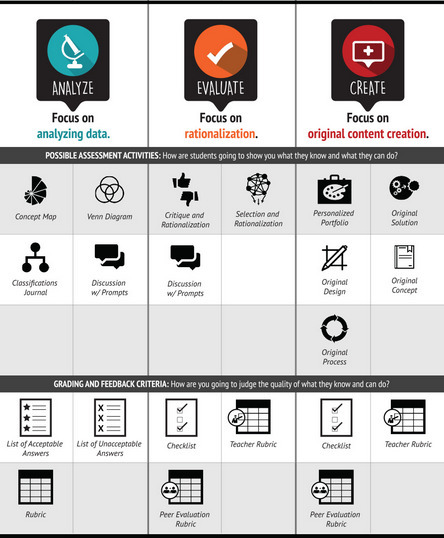Are you planning and communicating your feedback criteria? Here is our Blended and Online Assessment Taxonomy Design, an infographic to help you plan better assessments.
Get Started for FREE
Sign up with Facebook Sign up with X
I don't have a Facebook or a X account
 Your new post is loading... Your new post is loading...
 Your new post is loading... Your new post is loading...

Monica S Mcfeeters's curator insight,
February 18, 2014 5:11 AM
I am concerned about the massive growth of standardized test as a tool to motivate learning and improvement in education. These also even seem to be an intimidation tool used against staff and school systems these days far more than an formative evaluation tool. The best evaluations for both formative and summative are by far real life performance based and the real process is always iterative and ongoing. That is everything in learning is iterative with exception of life and death training that must be passed by a 100% success standard and then maintained at that.
Are standardized test a distraction from the sometimes messy nature of real learning and curiosity which causes people to want to learn something? Are we taking the valuable lessons of trial and error corrections totally out of the learning equation for fear of failure when everything hangs on a standardized test passing score?
|
Kathy Lynch's curator insight,
March 23, 2014 1:25 PM
Ideas to expand thinking on current assessments, particularly for those who do not test well. Thx Beth Dichter! 
Rosemary Tyrrell, Ed.D.'s curator insight,
March 24, 2014 1:46 PM
As teachers today we are told that we must teach our students and help them construct "enduring understanding", providing them with the ability to transfer knowledge from one subject area to another subject area. We are also told that we should personalize education, requiring us to know the strengths and weaknesses and incorporate this into our lessons. And let's not forget that we must also assess our students. How can we make our assessments help students with content retention? This post focuses on this question, and provides five suggestions on ways to do this. The first three suggestions are: Tests Where Notes or Textbooks are PermittedTake-Home TestsStudent-Made TestsThese types of tests may take more time to create but they have the ability to be written so that students have to do more than memorize information. There is more information on this in the post. The next suggestion is: Projects Pre-Approved by the TeacherThis requires that students demonstrate mastery of the subject. This will require the student to create (a 21st century goal) and additional information is in the post, including a discussion of what this might look like. The final suggestion is: Revisions and Retests to Build SkillsetsThis section discusses what we may do to help out student build their skillsets through feedback and opportunities to construct accurate information. As you read this post you may begin to consider alternative ways to assess your students that help them with content retention.

niftyjock's curator insight,
January 8, 2014 4:18 PM
Would role-plays fit into Performance Assessment? |













Nice info graphic for Blended Model Design and think through. Just add toolsets , curated content and PD